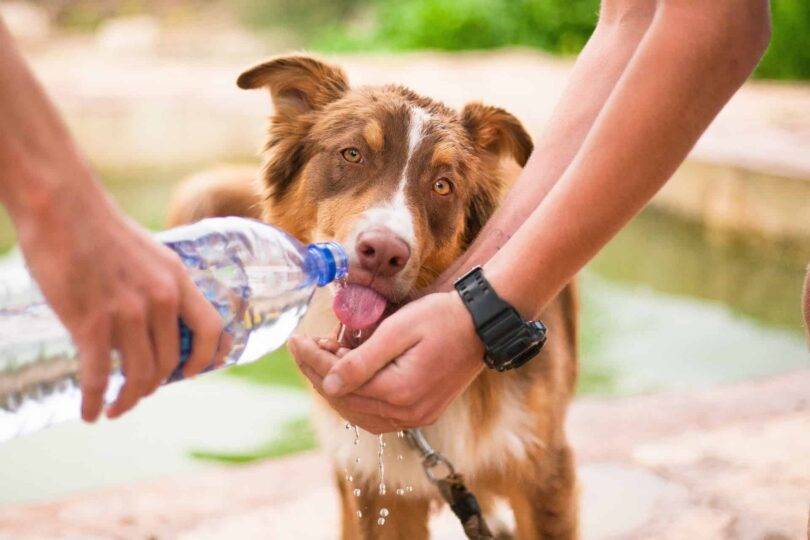It may seem counterintuitive, but the more popular and in-demand a puppy breed is, the more likely it is that these dogs will be sold to families without proper health certificates. Closer inspection gives the impression that breeders adhere to high standards and breeding practices, but the reality is that popular breeds tend to attract pseudo-breeders looking to make a quick buck.
Chocolate Labradors, for example, live shorter lives and have more health problems throughout their lives due to a reduced gene pool. Once the gene pool is reduced, it is difficult to improve a dog’s health due to the lack of genetic diversity.
While some Labrador health problems are genetic, others develop during their lifetime. This can be due to poor feeding habits, lack of regular testing and inadequate training during the puppy’s early days.
Even if your Labrador is predisposed to certain genetic diseases, there are ways that you, as a responsible owner, can make choices that will have a positive impact on your Labrador’s long-term health.
To help you ensure your dog’s health, we’ve put together this guide on how to assess the health of a Labrador puppy and make sure you’re working with a good breeder.
It all starts with responsible breeding
Part of the best practices of an ethical, responsible and knowledgeable breeder is to perform health checks on the dams and sires to be mated. These health checks allow breeders to better understand the gene pool they are working with, whether diseases are present and, if so, how to prevent them.
Detecting genetic problems is an essential part of improving the health of a breed at the national level. In other words, what an individual breeder does (or does not do) affects the health of all future generations and the dam and sire stocks of other breeders.
Just because a breeder offers a “health guarantee” does not mean that he is genetically testing his dams and sires. Rather, a “health guarantee” is intended to give the buyer (prospective owner) some peace of mind. The idea is that if the puppy is not in perfect health, they can “return” it. However, once a family has become attached to a puppy, they will not want to return their new little friend. Health guarantees are not synonymous with health certificates, so be sure to ask for records of health certificates and examinations before breeding.
Each breed of dog is more prone to a particular set of diseases and less likely to develop others. Breeders who perform genetic testing prior to breeding can ensure that their puppy has a lower risk of developing these genetically predisposed diseases. This is why health certificates are so necessary, and why they begin with the care and diligence of the breeder.
What is a health certificate?
Prior to breeding, breeders who care about the quality of life of their dogs obtain all relevant health certificates. These “pre-breeding” examinations should include a hip and elbow examination, especially in the case of Labradors, which are at a higher risk of developing problems such as hip and elbow dysplasia in later life.
Although the results of pre-breeding examinations are strictly confidential, the Orthopedic Foundation for Animals publishes the clear results of OFA testing. PennHIP is another radiographic test that measures the likelihood of a dam and sire’s offspring developing painful OA as adults.
Pre-mating examinations of dams and sires typically include the following tests:
Females: general physical examination, checking for vaginal abnormalities or strictures, and testing for brucellosis.
Stallions: testicles, prostate and penis checked for abnormalities, general physical examination and brucellosis testing.
Health screening tests differ from breed to breed. Labrador retrievers, for example, benefit from other genetic health tests. Dominant and recessive genes in Labrador Retrievers play a role in everything from behavior to coat color and ear length to more serious problems such as PRA blindness (which is looked for by an Optigen test).
However, please note that just because a mother or father tests positive for certain diseases does not mean they are unhealthy. It also does not mean that they will not reproduce. They could simply be carriers of the gene, which remains unexpressed, and this tells the breeder that some of their offspring may inherit that gene, whether it is expressed or not.
Common Health Problems in Labrador Puppies
Snowy Pines Labrador puppies are bred to be incredibly docile, but they are still energetic and curious little creatures who love to play and explore. These early years of their lives should not be marked by health problems.
Your breeder should be able to provide you with records of vaccinations and tests, as well as health certificates if required by your state. These documents will ensure that the puppy is healthy and free of any serious infectious diseases. Families should take their puppy to the veterinarian within 48 to 72 hours of the new puppy’s arrival home and double-check these assurances and vaccinations with the family veterinarian.
Once the initial assurances are clear, you’ll need to keep an eye on your Labrador puppies as they grow and develop into adulthood. Here are the most common problems that Labradors can face as they age.
1) Hip Dysplasia
Hip dysplasia is not limited to Labrador Retrievers. Any large breed of dog can have an abnormal formation of the hip joint and socket. The large size of the dog exacerbates this already existing problem which then leads to painful arthritis.
Both the mother and father must have excellent hip scores, and this is where the OFA test and certification can tell you if this is indeed the case or not.
2) Elbow Dysplasia
Elbow dysplasia is a similar problem, but more focused on the Labrador. It presents itself in various forms, such as lameness, abnormal gait, holding the elbow at odd angles, and a reluctance to play and move. Your dog may tire easily, experience stiffness when standing and have swelling of the joint.
3) Tricuspid valve dysplasia (TVD)
As a genetic disease, TVD is a congenital problem that could affect your puppy in the long run. The tricuspid valve of a dog with TVD is malformed and, as a result, the heart cannot pump blood as efficiently as in healthy dogs. A Labrador with DVT will have fluid or swelling, stunted growth and noisy breathing. Tests include a urinalysis, complete blood count and blood chemistry profile.
4) Centronuclear Myopathy
CNM, as it is better known, is similar to muscular dystrophy in humans. Dogs with CNM show weight loss, progressive loss of tendon reflexes, an awkward gait, and eventually exercise intolerance. This is a recessive genetic problem that can be tested for.
5) Exercise intolerance
Many of the above problems lead to exercise intolerance. Known as EIC, exercise intolerance is a progressive weakness and decline in Labradors due to related diseases. They experience weakness in their hindquarters and simply collapse after only 10 to 15 minutes of continuous high-intensity exercise.
6) Narcolepsy
Dogs have a good intuition for knowing when a seizure is about to occur in their humans. However, they are less aware of seizure on their own. Labradors with NARC problems may suddenly fall asleep or have sudden jerks that resemble an epileptic fit. This is not common, but a Labrador-centric test is available to detect this condition.
Like the above diseases, narcolepsy in Labradors is a recessive condition. Depending on the severity of the problem or genetic dominance, these tests provide knowledge and information to both the buyer and the breeder. This way, if related health problems arise in the future, owners who purchase Labrador puppies from reputable breeders have a clear family history.
Responsible breeders know that it is also not a good idea to limit the gene pool by selecting only dogs that do not have any of these genetic predispositions, as too many limitations could also lead to abnormalities in the future.
Conclusion
Health guarantees and health approvals should give you, the potential owner, more than just peace of mind. Health certificates help ensure that all future generations of puppies are healthy, happy and part of a diverse gene pool.
At Snowy Pines White Labs, we encourage our families to request health screenings based on two assurances: First, that the puppy chosen is currently healthy and free of infectious diseases. We recommend that families request health certificates from a veterinarian confirming the health of their puppy.
Secondly, breeders should also offer a certificate guaranteeing the absence of major congenital malformations and other genetic problems for a long period of time after the puppy has been brought home. Hip and elbow dysplasia and tricuspid valve dysplasia are examples of genetic conditions that should not occur in the early years of a puppy’s life.







